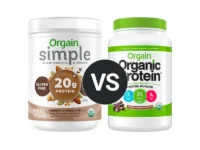Knowledge BaseYou're Questions Answered
BACK
Why is protein powder good for weight loss?
Protein powder can be a valuable tool for weight loss due to its effects on metabolism, appetite, and body composition. Incorporating protein powder into a weight loss plan can help enhance the effectiveness of diet and exercise efforts.
How Protein Powder Aids Weight Loss
- Satiety and Hunger Reduction: Protein is more satiating than carbohydrates and fats, which means it can help you feel fuller for longer. Consuming protein powder may help reduce overall calorie intake by minimizing hunger between meals1.
- Increased Metabolic Rate: High protein intake has been shown to boost metabolism slightly more than other macronutrients. This is due to the higher thermic effect of protein, which is the energy required to digest, absorb, and process nutrients2.
- Preservation of Muscle Mass: When losing weight, it's important to lose fat and not muscle. Protein powder can help preserve lean muscle mass, especially when combined with strength training. Maintaining muscle mass during weight loss can help sustain metabolic rate, as muscle tissue burns more calories than fat tissue3.
- Efficient Caloric Utilization: Protein is less likely to be stored as fat compared to carbohydrates and fats. The body uses protein primarily for repair and growth of tissues, including muscles, rather than for energy storage, which can make it an effective component of a weight loss diet4.
Choosing the Right Protein Powder for Weight Loss
- Low in Sugar and Additives: Select protein powders that are low in sugar and free from unnecessary additives that could contribute extra calories. Powders with minimal ingredients are generally a better choice for weight loss.
- Type of Protein: Different types of protein powders, such as whey, casein, or plant-based options like pea or rice protein, may have slightly different effects on satiety and muscle synthesis. Choosing a type that aligns with your dietary preferences and digestion can optimize weight loss results.
- Integrating with a Balanced Diet: For best results, integrate protein powder into a balanced diet that includes a variety of nutrients. Protein powder should complement your diet, not replace whole food sources of nutrition.
Overall, protein powder can be a convenient and effective supplement to aid weight loss by helping to reduce appetite, increase metabolism, and protect muscle mass. However, it should be used as part of an overall healthy lifestyle that includes proper diet and regular exercise.
Was this answer helpful? Let us know!
Like
References:
- Weigle, D. S., Breen, P. A., Matthys, C. C., Callahan, H. S., Meeuws, K. E., Burden, V. R., & Purnell, J. Q. (2005). A high-protein diet induces sustained reductions in appetite, ad libitum caloric intake, and body weight despite compensatory changes in diurnal plasma leptin and ghrelin concentrations. The American Journal of Clinical Nutrition, 82(1), 41-48.
- Paddon-Jones, D., Westman, E., Mattes, R. D., Wolfe, R. R., Astrup, A., & Westerterp-Plantenga, M. (2008). Protein, weight management, and satiety. The American Journal of Clinical Nutrition, 87(5), 1558S-1561S.
- Phillips, S. M. (2014). A brief review of higher dietary protein diets in weight loss: a focus on athletes. Sports Medicine, 44(S1), S149-S153.
- Westman, E. C., Mavropoulos, J., Yancy, W. S., & Volek, J. S. (2002). A review of low-carbohydrate ketogenic diets. Current Atherosclerosis Reports, 4(6), 476-483.
Add to this Answer
Related Questions
Related Reviews

Disclosure
Your Answer
Do you have a suggestion to improve the answer? Please detail your suggestions and provide any references to information that may support your answer if available.
The content on this site has not been written, reviewed or endorsed by a medical professional. We assume no liability for the misuse of supplements and recommend you review the label of any product, as well as consulting with your health care professional.
We are a participant in the Amazon Services LLC Associates Program, an affiliate advertising program designed to provide a means for us to earn fees by linking to Amazon.com and affiliated sites.
We are a participant in the Amazon Services LLC Associates Program, an affiliate advertising program designed to provide a means for us to earn fees by linking to Amazon.com and affiliated sites.
© 2026 ProteinPowder.com




